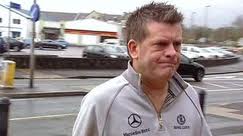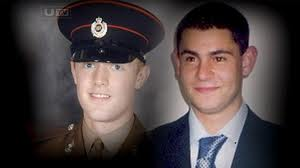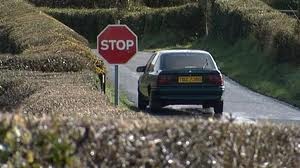BRIAN SHIVERS is to stand trial again for the murders of two soldiers at Massereene barracks almost four years ago, the Court of Appeal in Belfast ruled on Wednesday.
An application for Shivers to be tried for the murders was made by a counsel on behalf of Barra McGrory, the Director of the Public Prosecution Service for Northern Ireland.
Crown barrister Terence Mooney QC said Shivers still had a case to answer.
He told the three appeal court judges: “We submit it’s in the interest of justice that you may order a new trial.”
Mr Mooney said there was still a matter to be decided of whether Shivers, who was in court for the hearing, had foreknowledge of the attack and was part of the wider murder conspiracy.
A defence barrister argued that as the appeal judge had rejected key elements of the original prosecution and trial, if the same evidence was to be relied upon in a retrial, as it undoubtedly would, then that could potentially call into question the integrity of the administration of justice.
However, after considering the submissions Lord Chief Justice Sir Declan Morgan a retrial was in the interest of justice.
He said issues about the integrity of the evidence could be argued in front of the trial judge, who would be hearing the case in the absence of a jury or before another court.
Shivers will remain custody until his trial starts, which is likely to be as early as next month.
It will be before a judge sitting on his own without a jury to consider the prosecution evidence against Shivers.
On Tuesday, the mother of one of the soldier’s shot dead at Massereene barrack has described as “scandalous” a decison to quash murder convictions against Shivers.
Three appeal judges also allowed Shivers appeal against six counts of attempted murder and one of possession of two firearms and ammunition with intent to endanger life.
The offences arose out of the attack by two gunmen on soldiers in Masserene camp on Saturday, March 7, 2009.
The attack was claimed by the Real IRA.
Sappers Patrick Azimkar and Mark Quinsey died in a hail of automatic gunfire as they collected pizzas from delivery drivers.
They were due to leave the next day for a tour of Aghanistan.
Speaking from her home in London, Geraldine Azimkar said Tuesday’s decision has left their family disillusioned with the criminal justice system.
“It seems scandalous really that this terrible murder happened and the attempted murders happened and it looks like no one is going to be held to account for it,” Mrs Azimkar said.
“It is the failure of the criminal justice system, which is very highly loaded in favour of the defendant and therefore against the interests of victims and their loved ones.
“We feel there is no justice and it is going to be very hard to get peace in Northern Ireland when they see there is no justice.
“The whole thing is awful from start to finish,” added Geraldine Azimkar.
Brian Shivers was sentenced in February 2012 by Mr Justice Anthony Hart to life in prison with a minimum tariff of 25 years for the double murders.
He also handed down life in prison with a minimum term of ten 10 years on the other counts.
The Court heard that it had not been alleged by the prosecution that Mr Shivers was one of the gunmen and there was no evidence that he was in the car used in the attack.
As a result of DNA analysis, however, the trial judge found that his DNA was on two matchsticks used to ignite the car used in the attack and that it was possible his DNA was on a matchstick found near the car on the road and on a mobile phone found in the front of the vehicle.
The trial judge rejected Mr Shivers explanation for the presence of his DNA on these items as an invention and found that he had lied about his whereabouts and actions before he returned home on the night of the attack, concluding that he was satisfied beyond reasonable doubt that he had set fire to the car.
The court heard the trial judge said that if it was not disputed that Mr Shivers set fire to the vehicle he would be he would be guilty of the offences committed as a secondary party.
Sappers Patrick Azimkar and Mark Quinsey shot dead by the Real IRA
The appeal was grounded on a number of issues.
Firstly, that the trial judge was wrong to suggest that, if it was the appellant had set fire to the car, there was no dispute that he would be guilty of the offences as a secondary party.
Secondly, that in order to be guilty of the offences as a secondary party it was not sufficient to prove that assistance had been provided after the attack but that instead it was necessary to establish he had agreed to provide the assistance before the attack in contemplation of the type of offence which was carried out.
And, thirdly, that the trial judge had convicted the appellant as a secondary party when the prosecution had presented the case as one of joint enterprise.
Delivering the judgment of the Court, the Lord Chief Justice Sir Declan Morgan noted that at an early stage in the trial, the prosecution had indicated the case against Mr Shivers would proceed as an accessory after the fact or a party to the joint enterprise.
Sir Declan said said that it did not appear that issue had been taken with the prosecution characterisation of the case against Shivers and on that basis the Court accepted that the trial judge was wrong to state that if the appellant had set fire to the car he would be guilty as a secondary party.
He added, however, that the Court did not consider that affected the safety of the conviction.
He said whether or not any such concession had been made, it was still a matter for the trial judge to determine what facts he found proved, what inferences he drew, and what conclusions as to the guilt or otherwise of the appellant followed.
The Court heard that the prosecution case against Mr Shivers was circumstantial and relied upon several strands.
“It was based upon the fact that the attack was a professionally executed, well planned terrorist operation,” said Sir Declan.
“Information must have been gathered about the provision of pizzas to the front of the barracks.
“The movements of the delivery van must have been carefully monitored on the night of the attack.
“The attack vehicle had been purchased weeks before. The two mobile phones had been obtained but not activated until the day of the attack and the two assault rifles and 30 round magazines and ammunition obtained and made ready.”
The Real IRA Vauxhall Cavalier getaway car
The prosecution alleged the suggested role of Mr Shivers as the person who set fire to the attack vehicle required the availability of petrol and matches and his destruction of the vehicle was important in hindering detection.
The prosecution also alleged it was inconceivable that the person who provided transport for the gunmen and the driver of the attack vehicle would not be fully aware of the nature of the operation.
It submitted that the escape of the attackers and the destruction of the attack vehicle depended upon a trusted person who could be relied upon to rendezvous with the attack car at the agreed location and time.
That person would inevitably see the AK 47s and their magazines so it was important that the person was someone who was a trusted and willing participant in these murders.
The prosecution submitted that the court was entitled to draw adverse inferences from the failure of Mr Shivers to deal with any of these matters in evidence.
The Lord Chief Justice said that despite the manner in which the prosecution case was presented, the trial judge did not refer to the concept of joint enterprise in his judgment.
He said the issue for the court was whether it should be inferred that there was a common enterprise to which the appellant agreed prior to the attack to carry out a shooting attack with intent to kill.
The Chief Justice said that the trial judge had made no finding on the issue and consequently the Court of Appeal did not accept the appellant’s submission that the trial judge rejected the joint enterprise case.
Moving on the issue of conviction as a secondary party, the Chief Justice said that a person could be convicted without proof of prior knowledge of the actual crime intended if he contemplated the commission of one of a limited number of crimes and intentionally lent his assistance in the commission of such a crime.
He said it was irrelevant that the accused did not know which crimes were intended to be committed when he lent his assistance but the relevant crime must be within the contemplation of the accomplice.
The Chief Justice said, however, that the point at which assistance was lent was determinative.
He said in this case the acts of assistance allegedly provided by Mr Shivers were after the commission of the crime.
Sir Declan, sitting with Lord Justices Higgins and Girvan, held that the test applied by the trial judge required no knowledge of the attack until a rendezvous with the gunmen.
On that basis he stated: “We do not accept that a person who provides assistance after a murder with full knowledge of what has happened thereby becomes guilty of murder.
“There is no authority to support such a proposition. The learned trial judge made no findings as to when the appellant had the relevant knowledge.”
He added: “We conclude, therefore, that the appeal must be allowed.”
Counsel for the Public Prosecution Service is expected to confirm on Wednesday whether it is seeking fresh criminal proceedings.
Shivers, who maintained his innocence, appeared by prison video link to hear the outcome of his appeal.
His lawyer, Niall Murphy, said he was relieved by the verdict but expressed concerns about his health.
Mr Murphy said: “This is an example of the justice system working, however, we are gravely concerned at our client’s ongoing acute medical condition.
“He has been admitted to hospital for 56 days across three separate admissions since the hearing of his appeal in May and he is routinely refused access to his medication.
“Mr Shivers has been through a terrible ordeal whereby he has been repeatedly assaulted /abused whilst in prison and in hospital where he is continuously under armed guard.”
He added: “Mr Shivers looks forward to the end of this ordeal and hopes that this judgement is the first step towards that.”
An Army spokesman said: “Our thoughts remain with the families of Sappers Patrick Azimkar and Mark Quinsey at this extremely difficult time.”







One Response to SHIVERS TO FACE RE-TRIAL ON MASSEREENE BARRACKS MURDERS